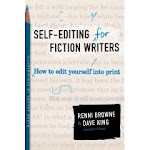First Pass – I make certain that each scene (if there’s more than one per chapter) has strong conflict and is necessary to move the story along. I’m ruthless here—good writing alone NEVER justifies a scene’s inclusion in the finished product.
Second Pass – I check my timeline and the sequence of events. I make sure everything is logical. For example, I look to see if I have a character giving a response before an event happens.
- Elisa jumped when a loud pop echoed in the chamber.
- The loud pop echoed through the chamber and Elisa jumped, knocking her head against the back of the chair.
The second example puts things more logically.
During this pass I also check to see if I have a balance of speaker beats and speaker tags.
Third Pass – I check for passive writing. I do a search for the word was and study each usage to make certain it’s past tense—not passive tense.
- Stuart was walking across the yard.
- Stuart walked (or better yet, strolled) across the yard.
In the second example the verb is much stronger.
Fourth Pass – I look for telling, instead of showing. These are some clue words I search for:
- Felt
- Remembered
- Knew
- Watched
- Saw
- Looked
- Was
- -ing words
- -ly words
Fifth Pass – I look for times when I’ve named emotions instead of showing them.
- Bethany felt panic course through her system. Had she waited too long?
- Bethany could feel her nails cutting into her palms as she fisted her hands. Had she waited too long?
Sixth Pass – I look to see if each scene contains all five senses.
Here are two senses I had to add to the scenes I was working on.
- Substandard lighting and circulation led to the lingering odor of sulfur mixed with leaching compounds. At almost two clicks beneath the metropolis the noxious haze, unable to dissipate, lingered to burn the throat of any unfortunate worker.
- Dawn had broken, but instead of beauty, a dank haze hung over the city. He could still taste the metallic bite in the polluted air.
This is the process I always use. It won’t catch everything, but it gets me a long way down the road. After going through these seven steps I set the chapter aside and move on to the next one. This gives me my second draft.
There are many good books out there on this subject, especially Self-Editing for Fiction Writers by our own Dave King. All I’ve done is break the process down into one I could replicate with any manuscript. What are some tricks you use when you’re in the editing process?












I finished the first draft of my first novel the end of June and have been trying to figure out how to go about editing it. This list is incredibly helpful. Thank you so much for posting it! Sarah
ReplyDeletehttp://weedingyourwriting.blogspot.com/
Sarah, I'm so glad this post helped. To go deeper into self-editing be sure to read the book, "Self-Editing for Fiction Writers" by our own, Dave King. God's timing is always perfect!
ReplyDeleteGreat post. I love editing and making my story better. I will print this and keep it for reference.
ReplyDeleteEdie - did you know I was planning a major offensive on my manuscript for the next 30 days? Thanks for the advice!
ReplyDeleteJanet, we're sisters of the pen - I love to play with words! Lynn - I promise I didn't know! Let me know if I can help in any way.
ReplyDeleteLove this list...will write it out, so I don't miss anything. The thing that helps me most is reading it out loud...hearing gives me a visual, if that makes sense! :)
ReplyDeleteExcellent list! This is something to keep handy.
ReplyDeleteThanks for the comments, Mid and Carla. I'm glad you've found this helpful. I also find reading something out loud helps so much - although it does make my family look at me funny!
ReplyDeleteI would like to know if there is a problem with printing off your blogs that has information I am needing at this time. The information isn't to be used elsewhere, just it's easier for me to follow if I have the steps in front of me. Thanks!
ReplyDeleteThis comment has been removed by the author.
ReplyDeleteHelpful, wonderful...I'm so happy to know of this blog!
ReplyDeleteWelcome, Britt! We're so glad you like what you see. Feel free to post any questions you might have.
ReplyDeleteGlad this is still here. Like the others, I finally finished my first draft and am trying to figure out my editing process. Your list is a great start.
ReplyDelete